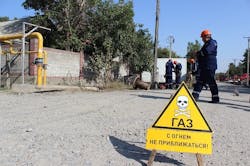In South Korea, a worker who became unconscious after inhaling toxic gas at a wastewater treatment plant in Busan was pronounced dead on Dec. 2, according to police.
The 52-year-old worker is believed to have died from hydrogen sulfide poisoning, according to the hospital he was treated at. According to The Korea Herald, the police have asked the National Forensic Service to carry out an autopsy to determine the exact cause of death.
According to The Korea Herald, the poisonous gas, believed to be hydrogen sulfide, was leaked at 1:08 p.m. on Nov. 28 at the plant. 4 of the 10 workers who inhaled the gas fell unconscious. The other three remain unconscious, according to the Korea Herald.
The hydrogen sulfide level at the site of the leak was measured at 150 parts per million, as of 2:21 p.m. on Nov. 28. Under the Occupational Safety and Health Act this is 10 times higher than the permissible level.
The Busan Fire Department said the toxic gas is believed to have been produced when workers poured alkaline wastewater into a well. According to The Korea Herald, the police collected samples from the well and requested an investigation by the National Forensic Service.


